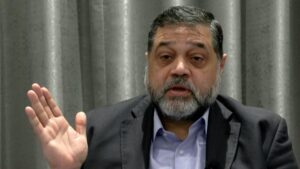Lebanon paralysis grows as security chief bows out
Beirut, Lebanon (AFP):
The head of one of Lebanon’s top security agencies has retired without a replacement, a casualty of the political and institutional paralysis which is stoking fears of a broader breakdown.
“The country is in a state of almost total disintegration,” said analyst Karim Bitar.
“We are seeing the collapse of all state institutions that were still holding up.”
Lebanon is navigating a devastating economic crisis that has plunged more than 80 percent of the population into poverty, according to the United Nations.
Strikes and absenteeism have paralysed public services, the state is barely able to provide a few hours of mains electricity a day, and the local currency has lost most of its value against the greenback since 2019.
Largely politically rudderless, Lebanon has been run by a caretaker government with limited powers since legislative elections in May last year.
Former president Michel Aoun left office at the end of October, and sectarian leaders have been squabbling over a replacement ever since.
Politicians have now failed to extend the mandate of retiring spymaster Abbas Ibrahim, head of the General Security agency, or name a replacement.
During more than a decade in the job, Ibrahim had to tackle numerous thorny challenges including the Syrian war’s spill-over into Lebanon, and was seen by many as a political mediator between the country’s divided political barons.
He also successfully mediated in the release of hostages held in Syria.
The current crisis “is probably the most serious in Lebanon’s history”, said Bitar of a country that endured civil conflict from 1975 to 1990 amid other shocks.
“The state cannot even manage to collect taxes,” Bitar said, while simple things such as vehicle registration have become almost impossible.
The failure to appoint a successor to Ibrahim is symptomatic of a much deeper gridlock.
With parliament split between supporters of the Iran-backed movement Hezbollah and its opponents — neither of which has a clear majority — Lebanese lawmakers have made 11 unsuccessful attempts to elect a new head of state.
Two independent lawmakers have been camped out in parliament since the last failed vote in mid-January, saying they will stay until a new president is elected.
By convention, Lebanon’s presidency goes to a Maronite Christian, the premiership is reserved for a Sunni Muslim and the post of parliament speaker goes to a Shiite Muslim.
Bishops from Lebanon’s Maronite Christian community have called for “a day of prayers” on March 10, hoping divine intervention will help elect a new president.







